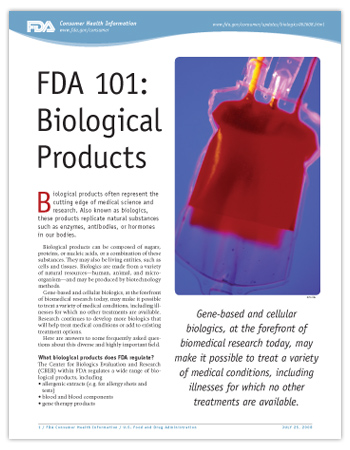For Consumers
FDA 101: Regulating Biological Products
Consumer Update
Printer-friendly PDF (196 KB) |
On this page:
- What biological products does FDA regulate?
- How do biologics differ from conventional drugs?
- What is FDA's role regarding biological products?
- What are the responsibilities of a licensed biologics manufacturer?
- How can adverse events related to biologic products be reported?
Biological products often represent the cutting edge of medical science and research. Also known as biologics, these products replicate natural substances such as enzymes, antibodies, or hormones in our bodies.
Biological products can be composed of sugars, proteins, or nucleic acids, or a combination of these substances. They may also be living entities, such as cells and tissues. Biologics are made from a variety of natural resources—human, animal, and microorganism—and may be produced by biotechnology methods.
Gene-based and cellular biologics, at the forefront of biomedical research today, may make it possible to treat a variety of medical conditions, including illnesses for which no other treatments are available. Research continues to develop more biologics that will help treat medical conditions or add to existing treatment options.
Here are answers to some frequently asked questions about this diverse and highly important field.
What biological products does FDA regulate?
The Center for Biologics Evaluation and Research (CBER) within FDA regulates a wide range of biological products, including
- allergenic extracts (e.g. for allergy shots and tests)
- blood and blood components
- gene therapy products
- devices and test kits
- human tissue and cellular products used in transplantation
- vaccines
The Center for Drug Evaluation and Research (CDER) within FDA regulates other categories of biological products mostly produced by biotechnology methods, including:
- monoclonal antibodies designed as targeted therapies in cancer and other diseases
- cytokines (types of proteins involved in immune response)
- growth factors (proteins that affect the growth of a cell)
- enzymes (types of proteins that speed up biochemical reactions), such as thrombolytics (used to dissolve blood clots)
- immunomodulators (agents that affect immune response)
How do biologics differ from conventional drugs?
Most drugs consist of pure chemical substances and their structures are known. Most biologics, however, are complex mixtures that are not easily identified or characterized. Biological products differ from conventional drugs in that they tend to be heat-sensitive and susceptible to microbial contamination. This requires sterile processes to be applied from initial manufacturing steps.
What is FDA's role regarding biological products?
FDA's regulatory authority for the approval of biologics resides in the Public Health Service Act (PHS). However, biologics are also subject to regulation under the Federal Food, Drug, and Cosmetic Act (FD&C Act) because most biological products also meet the definition of "drugs" cited within this Act.
Similarly, some medical devices used to produce biologics are regulated by CBER under the FD&C Act's Medical Device Amendments of 1976.
FDA also
- reviews new biological products and new indications and usage for already approved products in order to get biological products on the market for the treatment of known diseases
- helps protect against threats of emerging infectious diseases
- helps provide the public with information to promote the safe and appropriate use of biological products
- conducts inspections of plants that manufacture biologics before product approval is granted, and thereafter, on a regular basis
- monitors the safety of biological products after they are marketed
The PHS Act also
- allows FDA to approve biological products and immediately suspend licenses where there exists a danger to public health
- allows the agency to prepare or procure products in the event of shortages and critical public health needs
- enforces regulations to prevent the introduction or spread of communicable diseases within the country and between states
What are the responsibilities of a licensed biologics manufacturer?
The PHS Act requires individuals or companies who manufacture biologics for introduction into interstate commerce to hold a license for the products. These licenses are issued by FDA.
Some responsibilities of a licensed biologics manufacturer include
- complying with the appropriate laws and regulations relevant to their biologics license and identifying any changes needed to help ensure product quality
- reporting certain problems to FDA's Biological Product Deviation Reporting System
- reporting and correcting product problems within established timeframes
- recalling or stopping the manufacture of a product if a significant problem is detected
How can adverse events related to biologic products be reported?
Contact FDA's MedWatch program.
For vaccines, contact the Vaccine Adverse Event Reporting System (VAERS).
This article appears on FDA's Consumer Updates page, which features the latest on all FDA-regulated products.
Updated: July 25, 2008







